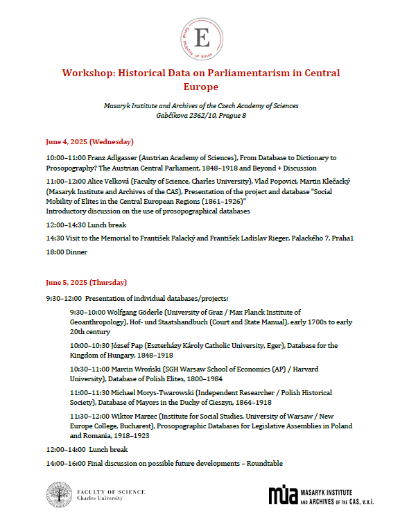Bohemian Diet (1861–1913) – 11 electoral terms
- the deputies under study active in the diet since it was established in 1861 until it was dissolved in 1913 (the last elections took place in 1908, but it was only in 1908 that the Assembly actually met in this last electoral period)
The diet numbered a total of 241 deputies (following the 1882 division of Prague University they were 242): 5 (6) virilists and 236 elected deputies divided into three curiae subdivided into 4 electoral groups:
- Landowners' Curia – 70 deputies representing large landowners
- Curia of cities and trade and business chambers:
- Group of towns and industrial places – 72 deputies
- Group of trade and business chambers – 15 deputies
- Curia of rural communities – 79 deputies
Imperial Council (1861–1918) – 12 electoral terms
Imperial Council was established in 1861 as an advisory assembly to the Sovereign. It was a bicameral body, consisting of the House of Deputies, who were elected indirectly (by land diets) until 1873 and then directly, and the non-elected House of Lords.
House of Deputies of the Imperial Council (1861–1865) – 1 electoral term
Based on the February Patent of 1861 the House of Deputies was supposed to meet in two forms – a wide one and a narrow one (i.e. without the deputies of the Lands of the Crown of St. Stephen and the Kingdom of Lombardy and Venice), but it never actually met. The deputies were divided into four curiae:
- Landowners' Curia
- Curia of towns
- Curia of trade and business chambers
- Curia of rural communities
In its wider form it was supposed to consist of 343 deputies, the narrow one of 203. Out of that, 54 seats were reserved for Bohemia and 26 for Transylvania. Based on the September Manifesto it was dissolved in 1865.
House of Deputies of the Imperial Council (1867–1873) – 3 electoral terms
Pursuant to the December Constitution of 1867 Imperial Council was restored merely as a parliament of Cisleithania (the overall number of 203 deputies was maintained), with legislative powers granted to it.
House of Deputies of the Imperial Council (1873–1897) – 4 electoral terms
In 1873 electoral law was changed so that henceforth deputies of the Imperial council were no longer to be elected by the land diets, as was the case until then, but directly by citizens. Also, the total number of deputies was increased from 203 to 353, with 92 seats reserved for Bohemia. A partial electoral reform in 1884 lowered the census and as a result, the number of eligible voters increased.
House of Deputies of the Imperial Council (1897–1907) – 2 electoral terms
The Badeni electoral reform in 1896 changed the system of curiae, adding one new (fifth) general curia, which granted universal suffrage to all men over the age of 24. This resulted in a substantial overall extension of suffrage, with a further increase in the number of deputies from 353 to 425 (with 110 seats for Czech deputies):
- Landowners' curia - a total of 85 deputies (23 from Bohemia)
- Curia of towns - a total of 188 deputies (32 from Bohemia)
- Curia of trade and business chambers – a total of 21 deputies (7 from Bohemia)
- Curia of rural communities – a total of 129 deputies (30 from Bohemia)
- General curia – a total of 72 deputies (18 from Bohemia)
House of Deputies of the Imperial Council (1907–1918) – 2 electoral terms
In 1907 universal and equal suffrage for men was introduced in Cisleithania, putting an end to the system of curiae in the Imperial Council (no changes were made to electoral law regulating elections to Land Diets). The number of deputies was increased from 425 to 516 (130 seats for Bohemia). The last elections took place in 1911, during WWI the Imperial Council met no sooner than 30 May 1917, and for the last time, in an incomplete setup, it deliberated on 12 November 1918.


